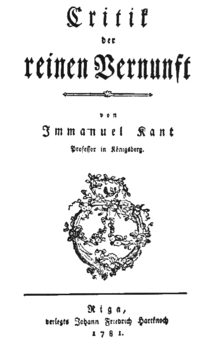Critique of Pure Reason

Title page of the 1781 edition.
|
|
| Author | Immanuel Kant |
|---|---|
| Original title | Critik a der reinen Vernunft |
| Translator | see below |
| Country | Germany |
| Language | German |
| Subject | Epistemology |
| Published | 1781 |
| Pages | 856 (first German edition) |
| aKritik in modern German. | |
The Critique of Pure Reason (German: Kritik der reinen Vernunft, KrV) (1781; second edition 1787) is a book by Immanuel Kant that is considered one of the most influential works in the history of philosophy. Also referred to as Kant's First Critique, it was followed by the Critique of Practical Reason (1788) and the Critique of Judgment (1790). In the preface to the first edition Kant explains what he means by critique of pure reason,
I do not mean by this a critique of books and systems, but of the faculty of reason in general, in respect of all knowledge after which it may strive independently of all experience.
Dealing with questions concerning the foundations and extent of human knowledge, Kant builds on the work of empiricist philosophers such as John Locke and David Hume, as well as taking into account the theories of rationalist philosophers such as Gottfried Wilhelm Leibniz and Christian Wolff. Kant expounds new ideas on the nature of space and time, and claims to solve the problem which Hume posed regarding human knowledge of the relation of cause and effect, and to have assessed the ability of the human mind to engage in metaphysics.
Knowledge independent of experience is referred to by Kant as "a priori" knowledge, while knowledge obtained through experience is termed "a posteriori". According to Kant, "a priori" knowledge expresses necessary truths. Statements which are necessarily true cannot be negated without becoming false. Examples provided by Kant include the propositions of mathematics, propositions "from the understanding in its quite ordinary employment", such as "Every alteration must have a cause", as well as propositions from "natural science (physics)", such as "in all changes in the material world the quantity of matter remains unchanged".
...
Wikipedia
